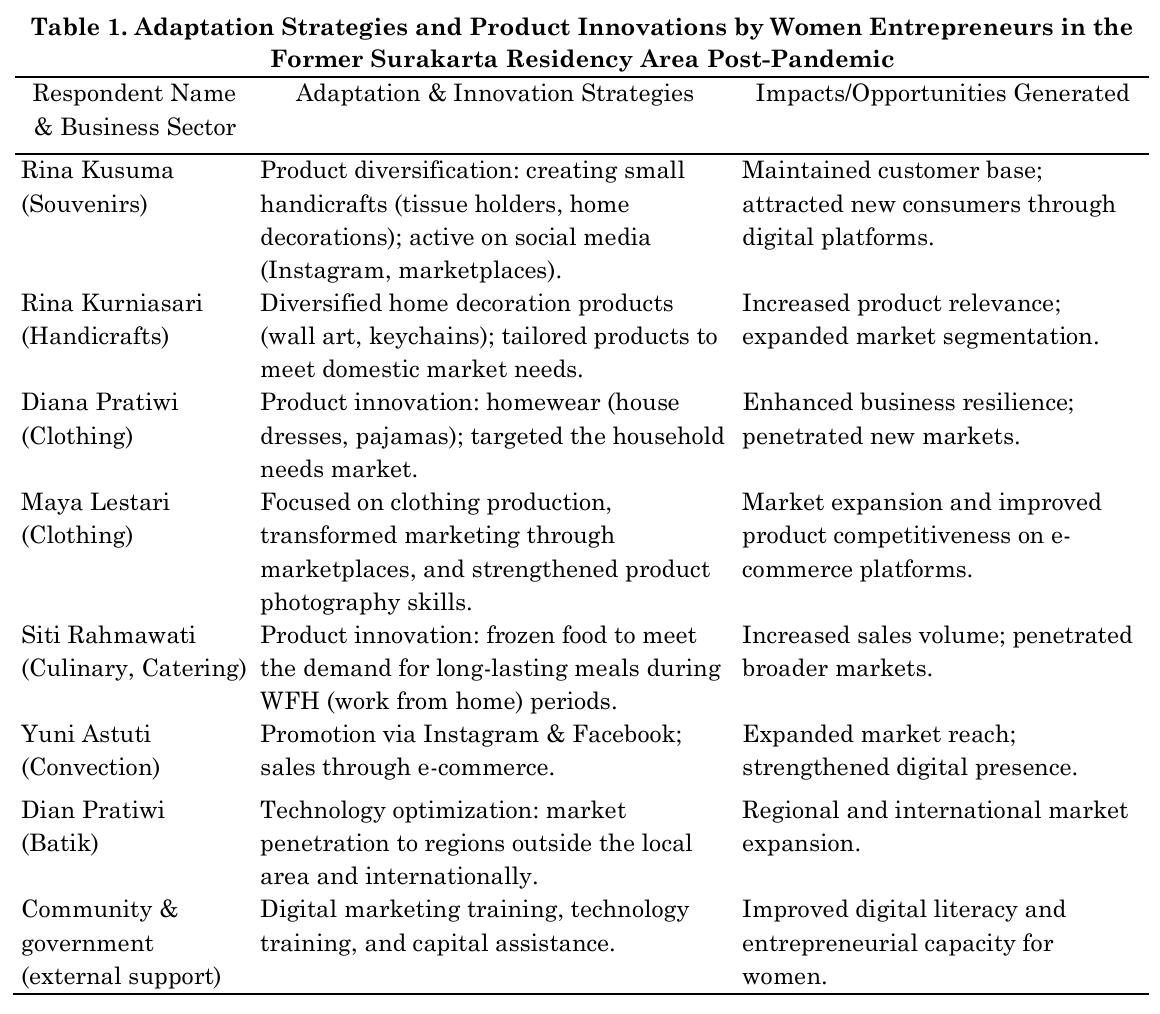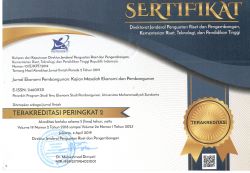The Role of Women Entrepreneurs in Rebuilding the Economy After the Pandemic
DOI:
https://doi.org/10.23917/jep.v26i1.8617Keywords:
Women entrepreneurs, MSMEs, economic recovery, digital transformation, SurakartaAbstract
The COVID-19 pandemic significantly impacted Surakarta’s economy. MSMEs, especially those led by women, are facing serious challenges. Women entrepreneurs have played a key role in economic recovery through adaptation, innovation, and digital transformation. This study examines their strategies using a qualitative case study approach, collecting data from 14 women entrepreneurs through semi-structured interviews. The findings show that they responded to the crisis by diversifying products, adopting digital marketing, and building business networks. However, they continue to face challenges such as limited capital, rising raw material costs, and balancing business with domestic responsibilities. The study highlights the need for more substantial financial access, digital literacy training, and government support to sustain women-led businesses. Strengthening these areas will enhance the resilience of Surakarta’s economy.
Downloads
References
Ahmetaj, B., Kruja, A. D., & Hysa, E. (2023). Women Entrepreneurship: Challenges and Perspectives of an Emerging Economy. Administrative Sciences, 13(4), 1-20 https://doi.org/10.3390/admsci13040111
Amalia, A. D., & Melati, F. C. (2021). Analysis of MSMEs Recovery using Digital Technology in the Covid-19 Pandemic Era. Ekuilibrium: Jurnal Ilmiah Bidang Ilmu Ekonomi, 16(2), 117-128. https://doi.org/10.24269/ekuilibrium.v16i2.2021.pp117-128
Amandaria, R., Darma, R., Tenriawaru, N., Fudjaja, L., Untari, & Akzar, R. (2025). Gender, empowerment, and rural sustainable development: A case study of crab business integration. Open Agriculture, 10(1), 1-16. https://doi.org/10.1515/opag-2025-0416
Andriamahery, A., & Qamruzzaman, M. (2022). Do access to finance, technical know-how, and financial literacy offer women empowerment through women’s entrepreneurial development?. Frontiers in psychology, 12(1), 1-16. https://doi.org/10.3389/fpsyg.2021.776844
Arif, M., & Purnomo, D. (2017). Measuring spatial cluster for leading industries in surakarta with exploratory spatial data analysis (ESDA). Jurnal Ekonomi Pembangunan: Kajian Masalah Ekonomi Dan Pembangunan, 18(1), 64-81. https://doi.org/10.23917/jep.v18i1.4178
Babajide, A. A., Obembe, D., Solomon, H., & Woldesenbet, K. (2022). Microfinance and entrepreneurship: the enabling role of social capital amongst female entrepreneurs. International Journal of Social Economics, 49(8), 1152-1171. https://doi.org/10.1108/IJSE-11-2020-0745
Balhareth, A., AlDuhileb, M. A., Aldulaijan, F. A., & Aldossary, M. Y. (2020). Impact of COVID-19 pandemic on residency and fellowship training programs in Saudi Arabia: A nationwide cross-sectional study. Annals of Medicine and Surgery, 57(1), 127-132. https://doi.org/10.1016/j.amsu.2020.07.025
Banihani, M. (2020). Empowering Jordanian women through entrepreneurship. Journal of Research in Marketing and Entrepreneurship, 22(1), 133-144. https://doi.org/10.1108/JRME-10-2017-0047
Bartik, A. W., Bertrand, M., Cullen, Z., Glaeser, E. L., Luca, M., & Stanton, C. (2020). The impact of COVID-19 on small business outcomes and expectations. Proceedings of the national academy of sciences, 117(30), 17656-17666. https://doi.org/10.1073/pnas.2006991117
Berawi, M. A. (2021). Innovative technology for post-pandemic economic recovery. International Journal of Technology, 12(1), 1-4. https://doi.org/10.14716/ijtech.v12i1.4691
Bichkoff, H., Huerta Niño, R., Hemmerling, A., Ho, K., Huancas, C. G., Burke, A., ... & Wong, M. (2023). Recovery and Resilience in the Canal Community: Economic Impacts and Solutions During the COVID-19 Pandemic. Journal of Racial and Ethnic Health Disparities, 10(3), 1234-1258. https://doi.org/10.1007/s40615-022-01310-w
Carracedo, P., Puertas, R., & Marti, L. (2021). Research lines on the impact of the COVID-19 pandemic on business. A text mining analysis. Journal of Business Research, 132(1), 586-593. https://doi.org/10.1016/j.jbusres.2020.11.043
Coleman, S., Henry, C., Orser, B., Foss, L., & Welter, F. (2019). Policy support for women entrepreneurs’ access to financial capital: Evidence from Canada, Germany, Ireland, Norway, and the United States. Journal of Small Business Management, 57(1), 296-322. https://doi.org/10.1111/jsbm.12473
Cueto, L. J., Frisnedi, A. F. D., Collera, R. B., Batac, K. I. T., & Agaton, C. B. (2022). Digital innovations in MSMEs during economic disruptions: experiences and challenges of young entrepreneurs. Administrative Sciences, 12(1), 1-25. https://doi.org/10.3390/admsci12010008
Creswell, J. W., & Poth, C. N. (2016). Qualitative inquiry and research design: Choosing among five approaches. Sage publications. https://www.academia.edu/download/55010759/creswell_Qualitative_Inquiry_2nd_edition.pdf
Damayanti, T. W., Supramono, S., Kristianti, I., & Adhitya, D. (2024). Recovery Speed of Micro, Small, and Medium Enterprises (MSMEs) Following the COVID-19 Pandemic: The Influence of Entrepreneurial Capacity and Characteristics. International Journal of Sustainable Development & Planning, 19(3), 1121-1129. https://doi.org/10.18280/ijsdp.190330
De Simone, S., Pileri, J., Rapp-Ricciardi, M., & Barbieri, B. (2021). Gender and entrepreneurship in pandemic time: what demands and what resources? An exploratory study. Frontiers in Psychology, 12(1), 1-11. https://doi.org/10.3389/fpsyg.2021.668875
Demartoto, A., Murti, B., & Pujihartati, S. H. (2022, November). Community Participation, Motivation, and Capacity as the Principle in Collaborative Governance-Based Covid-19 Prevention and Management in Banyuanyar, Surakarta Indonesia. In International Conference on Communication, Policy and Social Science (InCCluSi 2022) (pp. 363-371). Atlantis Press. https://doi.org/10.2991/978-2-494069-07-7_41
Donthu, N., & Gustafsson, A. (2020). Effects of COVID-19 on business and research. Journal of business research, 117(1), 284-289. https://doi.org/10.1016/j.jbusres.2020.06.008
Etikan, I., Musa, S. A., & Alkassim, R. S. (2016). Comparison of convenience sampling and purposive sampling. American journal of theoretical and applied statistics, 5(1), 1-4. https://doi.org/10.11648/j.ajtas.20160501.11
Fadhli, M. (2022). Study of entrepreneurship orientation and self-efficacy on entrepreneurship success and moderation of environmental instability in covid 19 pandemic conditions. Journal of Management and Islamic Finance, 2(2), 222-239. https://doi.org/10.22515/jmif.v2i2.5275
Flick, U. (2022). An introduction to qualitative research. SAGE Publications. https://www.torrossa.com/en/resources/an/5409482
Gao, J., Siddik, A. B., Khawar Abbas, S., Hamayun, M., Masukujjaman, M., & Alam, S. S. (2023). Impact of E-commerce and digital marketing adoption on the financial and sustainability performance of MSMEs during the COVID-19 pandemic: An empirical study. Sustainability, 15(2), 1-21. https://doi.org/10.3390/su15021594
Ge, T., Abbas, J., Ullah, R., Abbas, A., Sadiq, I., & Zhang, R. (2022). Women’s entrepreneurial contribution to family income: innovative technologies promote females’ entrepreneurship amid COVID-19 crisis. Frontiers in Psychology, 13(1), 1-10. https://doi.org/10.3389/fpsyg.2022.828040
Guest, G., Bunce, A., & Johnson, L. (2006). How many interviews are enough? An experiment with data saturation and variability. Field methods, 18(1), 59-82. https://doi.org/10.1177/1525822X05279903
Gupta, A., & Kumar Singh, R. (2023). Managing resilience of micro, small and medium enterprises (MSMEs) during COVID-19: analysis of barriers. Benchmarking: An International Journal, 30(6), 2062-2084. https://doi.org/10.1108/bij-11-2021-0700
Hamdani, M. L., & Amalia, N. (2022). The effect of business digitalization, technology utilization, and financial literacy on the sustainability of MSMEs in Surakarta. Review of Management Accounting and Business Studies, 3(2), 160-167. https://doi.org/10.38043/revenue.v3i2.4841
Harel, R. (2021). The impact of COVID-19 on small businesses’ performance and innovation. Global Business Review, 1(1), 1-22. https://doi.org/10.1177/09721509211039145
Henry, C., Coleman, S., Orser, B., & Foss, L. (2022). Women’s entrepreneurship policy and access to financial capital in different countries: an institutional perspective. Entrepreneurship Research Journal, 12(3), 227-262. https://doi.org/10.1515/erj-2022-0234
Katadata. (2023). Awal 2023, Ada 7,9 Juta Pengangguran di Indonesia. https://databoks.katadata.co.id/datapublish/2023/05/05/awal-2023-ada-79-juta-pengangguran-di-indonesia (diakses pada 14 Januari 2025).
Kemenkeu. (2022). Pandemi Covid-19 Dan Menurunnya Perekonomian Indonesia. https://www.djkn.kemenkeu.go.id/artikel/baca/16064/Pandemi-Covid-19-Dan-Menurunnya-Perekonomian-Indonesia.html.
Kimhi, S., Marciano, H., Eshel, Y., & Adini, B. (2020). Recovery from the COVID-19 pandemic: Distress and resilience. International journal of disaster risk reduction, 50(1), 1-8. https://doi.org/10.1016/j.ijdrr.2020.101843
Kusumastuti, D., & Sari, S. M. (2023, June). Strengthening the Creative Economy of Small and Medium Industries in Supporting the Tourism Potential in Surakarta. In International Conference on Multidisciplinary Studies (ICOMSI 2022) (pp. 25-34). Atlantis Press. https://doi.org/10.2991/978-2-38476-072-5_4
Lamidi, L., & Rahadhini, M. (2021). The effect of digital marketing and financial inclusion on business sustainability through Marketing Performance Culinary Msme’s in Surakarta. Journal of Economics, Finance And Management Studies, 4(6), 716-723. https://doi.org/10.47191/jefms/v4-i6-06
Manolova, T. S., Brush, C. G., Edelman, L. F., & Elam, A. (2020). Pivoting to stay the course: How women entrepreneurs take advantage of opportunities created by the COVID-19 pandemic. International Small Business Journal, 38(6), 481-491. https://doi.org/10.1177/0266242620949136
Miles, M. B., & Huberman, A. M. (1994). Qualitative data analysis: An expanded sourcebook. Thousand Oaks. https://psycnet.apa.org/record/1995-97407-000?utm_medium=email&utm_source=transaction
Mukaromah, H., Permana, C. T., & Astuti, W. (2023, May). Aiming towards creative city: how Surakarta City government applied the Sustainability-Oriented Innovation (SOI) as a strategy to empower local small and medium creative industries. In IOP Conference Series: Earth and Environmental Science (Vol. 1186, No. 1, p. 012018). IOP Publishing. https://doi.org/10.1088/1755-1315/1186/1/012018
Naredia, S. P., Demartoto, A., & Romadhon, A. (2023). Capacity Development of Micro, Small, and Medium Scale Enterprise Actors in Tourism Sector using Tourism Digital Literacy Approach in Surakarta Indonesia. Proceedings Series on Social Sciences & Humanities, 12(1), 307-310. https://doi.org/10.30595/pssh.v12i.812
Njie, B., & Asimiran, S. (2014). Case study as a choice in qualitative methodology. Journal of research & method in Education, 4(3), 35-40. http://dx.doi.org/10.9790/7388-04313540
Nouri, P. (2023). Women entrepreneurs’ persistence at the time of the COVID-19 pandemic: a decision-making perspective. Journal of Entrepreneurship in Emerging Economies, 15(6), 1594-1611. https://doi.org/10.1108/JEEE-03-2022-0090
Nsabimana, A., & Uwimpuhwe, D. (2024). Impact of gender-based violence on local economy: a case study of gasabo district. American Journal of Gender and Development Studies, 3(1), 19-32. https://doi.org/10.58425/ajgds.v3i1.254
Pratio, G., Margono, M., Zulkarnaen, D., & Kertati, I. (2023). Kajian digitalisasi ikm dan umkm kota surakarta. Pusat Kajian Penelitian dan Pengembangan Daerah Kota Surakarta, 2(1), 29-42. https://doi.org/10.58684/jbs.v2i1.24
Prayag, G., Chowdhury, M., & Ozanne, L. K. (2024). Dynamic, technological and marketing capabilities in MSMEs’ recovery from COVID-19–the moderating role of organizational learning. Asia Pacific Journal of Marketing and Logistics, 36(7), 1741-1766. https://doi.org/10.1108/apjml-08-2023-0744
Purwanto., & Suprihati. (2024). Analisis sistem pengawasan mui terhadap sertifikat halal pada umkm di kota surakarta. El-Mal Jurnal Kajian Ekonomi & Bisnis Islam, 5(11), 5172-5184. https://doi.org/10.47467/elmal.v5i11.5132
Rosepti, P., & Niasari, C. (2022). Female Entrepreneurship in Leading Digitalization as a Marketing Strategy for Prosperous MSMEs and Women’s Empowerment: A Case Study of Latifa Indonesia. Muslim Business and Economic Review, 1(2), 305-323. https://doi.org/10.56529/mber.v1i2.72
Rosyadi, I., & Purnomo, D. (2012). Tingkat ketahanan pangan rumah tangga di desa tertinggal. Jurnal Ekonomi Pembangunan: Kajian Masalah Ekonomi dan Pembangunan, 13(2), 303-315. https://doi.org/10.23917/jep.v13i2.176
Sahi, G. K., Modi, P., & Mantok, S. (2023). New product innovations in times of crisis: How did women entrepreneurs survive the COVID-19 crisis?. Industrial Marketing Management, 111(1), 19-29. https://doi.org/10.1016/j.indmarman.2023.03.004
Sari, L. E., Sobri, K. M., Lionardo, A., & Nadjib, A. (2022). The Relationship of Micro Small and Medium Enterprises, Local Government, and the Banking Sector in the Implementation of Economic Development Policies in the Era of the Covid-19 Pandemic. JPPUMA: Jurnal Ilmu Pemerintahan dan Sosial Politik UMA (Journal of Governance and Political Social UMA), 10(2), 140-148. https://doi.org/10.31289/jppuma.v10i2.7029
Setkab. (2024). Dinamika Pertumbuhan Ekonomi Indonesia 2023 dan Proyeksi Tantangan 2024. https://setkab.go.id/dinamika-pertumbuhan-ekonomi-indonesia-2023-dan-proyeksi-tantangan-2024/.
Setyowati, E. (2009). Analisis Tingkat Partisipasi Wanita dalam Angkatan Kerja di Jawa Tengah Periode Tahun 1982-2000. Jurnal Ekonomi Pembangunan: Kajian Masalah Ekonomi dan Pembangunan, 10(2), 215-233. https://doi.org/10.23917/jep.v10i2.801
Shastri, S., Shastri, S., & Pareek, A. (2019). Motivations and challenges of women entrepreneurs: Experiences of small businesses in Jaipur city of Rajasthan. International Journal of Sociology and Social Policy, 39(6), 338-355. https://doi.org/10.1108/IJSSP-09-2018-0146
Subekti, P., Bajari, A., Sugiana, D., & Hafiar, H. (2023). Collaboration and Social Networks in the Entrepreneurial Ecosystem: Pillars to Shape the Resilience MSME Actors in the Post-Pandemic Era. Journal of Law and Sustainable Development, 11(9), 1103-1103. https://doi.org/10.55908/sdgs.v11i9.1103
Sucahyo, U. S., Damayanti, T. W., & Supramono, S. (2024). Unlocking success: Nexus between entrepreneurial orientation and financial performance in culinary MSMEs. Journal of Economics, Business, and Accountancy Ventura, 27(1), 1-13. https://doi.org/10.14414/jebav.v27i1.4432
Suminah, S., Suwarto, S., Sugihardjo, S., Anantanyu, S., & Padmaningrum, D. (2022). Determinants of micro, small, and medium-scale enterprise performers’ income during the Covid-19 pandemic era. Heliyon, 8(7), 1-10. https://doi.org/10.1016/j.heliyon.2022.e09875
Supriyono, E., Sumarta, N. H., & Narulitasari, D. (2021). Pengelolaan Keuangan Keluarga pada Ibu Rumah Tangga Pemilik Umkm Sebagai Masyarakat Terdampak Covid-19 di Kelurahan Kauman, Surakarta. Budimas: Jurnal Pengabdian Masyarakat, 3(1), 109-115. http://dx.doi.org/10.29040/budimas.v3i1.1634
Waluyo, D., Kusuma, P., & Eric., M. (2022). Improving digital literacy for aisyiyah entrepreneurs to win business competition in the pandemic period (surakarta residency study). E-Amal Jurnal Pengabdian Kepada Masyarakat, 2(2), 1055-1060. https://doi.org/10.47492/eamal.v2i2.1532
Wang, X., Cai, L., Zhu, X., & Deng, S. (2022). Female entrepreneurs’ gender roles, social capital and willingness to choose external financing. Asian Business & Management, 21(3), 1-10. https://doi.org/10.1057/s41291-020-00131-1
Wibowo, G. A. (2023). Total UMKM di Solo 11.157 Pada 2022, Terbanyak di Pasar Kliwon. https://www.google.com/amp/s/bisnis.espos.id/total-umkm-di-solo-11-157-pada-2022-terbanyak-di-pasar-kliwon-1576632/amp (diakses pada 14 Januari 2025).
World Bank. (2021). Indonesia Gender Equality Program. https://www.worldbank.org/in/country/indonesia/brief/gender-equality-for-growth-research-and-analytical-program-in-indonesia.
Wulandari, M. C., Putro, T. R., & Prasetyani, D. (2023). Digital Adaptation to Performance of SMEs in Surakarta City, Indonesia. International Journal of Multicultural and Multireligious Understanding, 10(5), 238-244. https://doi.org/10.18415/ijmmu.v10i5.4606

Submitted
Accepted
Published
How to Cite
Issue
Section
License
Copyright (c) 2025 Ali Zainal Abidin, Siti Aisyah, Muhammad Randhy Kurniawan, Kenny Pradipta Montoya Putra Pratama , Sidra Iqbal, Magarsa Abara

This work is licensed under a Creative Commons Attribution 4.0 International License.













